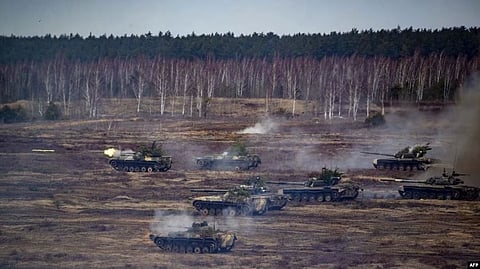New developments:
“Russia must lose on the battlefield, in the economy, in international relations, and in its attempts to replace the historical truth with some imperial myths. … It is the full-scale defeat of Russia that will be a reliable guarantee against new aggressions and crises.” — Ukrainian President Volodymyr Zelenskyy said Saturday evening in his daily address.
Ukraine didn't receive a peace mediation proposal from China or a proposal to meet with Chinese President Xi Jinping, Zelenskyy told The Japan News.
The head of the U.N.'s International Atomic Energy Agency Rafael Grossi will visit the Zaporizhzhia nuclear power plant in Eastern Ukraine next week to assess the serious security situation there, Reuters reports.
Russia has “likely launched” at least 71 Iranian-designed Shahed series one-way attack uncrewed aerial vehicles or OWA-UAVS against targets across Ukraine since the beginning of March, according to the British Defense Ministry’s daily intelligence update on Russia’s invasion of Ukraine, posted Sunday on Twitter.
The OWA-UAVS attacks stopped for two weeks in late February, but Russia is likely receiving a supply of them again, the ministry said.
Russia is probably launching the aerial vehicles from two axes: from Russia’s Krasnodar krai in the east and from Bryansk oblast in the northeast. These locations, the ministry said, allow Russia flexibility in targeting a broad sector of Ukraine and decreases flying time to targets in the north of Ukraine. The locations are also likely part of a strategy to “further attempt to stretch Ukrainian air defenses.”
Russian President Vladimir Putin announced a deal Saturday to deploy tactical nuclear weapons into neighboring Belarus, saying the United States has been placing such arms in the territory of its allies for decades.
In an interview on Russian state television, translated by Reuters, Putin said “the trigger for his comments was the statement by the British deputy minister of defense that they are going to supply depleted uranium munitions to Ukraine.”
FILE - Russian President Vladimir Putin, right, meets with his Belarusian counterpart Alexander Lukashenko at the Novo-Ogaryovo state residence outside Moscow, Feb. 17, 2023. (Photo by Vladimir Astapkovich/Sputnik/AFP)
Depleted uranium is a byproduct of the uranium enrichment process needed to create nuclear weapons. The rounds retain some radioactive properties, but they can’t generate a nuclear reaction like a nuclear weapon would, RAND nuclear expert and policy researcher Edward Geist said.
Tactical nuclear weapons have a short range and a low yield compared with the nuclear warheads fitted to long-range missiles, which are much more powerful.
The United States has about 200 tactical nuclear weapons. The 4-meter B61 nuclear bombs have yields of 0.3 to 170 kilotons. About half of them are deployed to air bases in Italy, Germany, Turkey, Belgium and the Netherlands.
The U.S. believes Russia has around 2,000 working tactical warheads.
Moscow, which has never deployed its nuclear weapons outside its borders, says it will maintain control over them. However, Putin did not say how many tactical nuclear weapons it would send to Belarus or when it would — only that the construction of the storage facility there would be complete by July 1.


